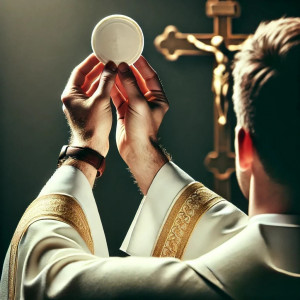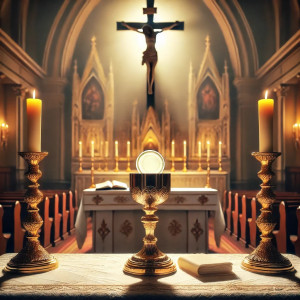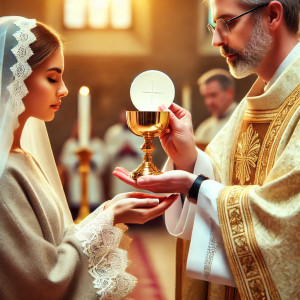Paragraph 1413 of the Catechism of the Catholic Church, states that, through the consecration performed by the priest (priest or bishop), the transubstantiation of bread and wine into the Body and Blood of Christ takes place. Although the taste, smell, and physical characteristics of bread and wine remain, their substance is completely altered (it is no longer bread, it is no longer wine; it is Christ in Body, Blood, Soul, and Divinity, truly and really present, alive and glorious).
The Eucharist is the center of the Catholic faith because it represents Christ's unique sacrifice, perpetuated and made present in every Mass. According to the Letter to the Hebrews, Christ's sacrifice is "unique and unrepeatable" (Hebrews 7:27; 9:26; 10:10). This means that Christ offered Himself once for the salvation of humanity, and the Eucharist makes this sacrifice present without repeating it.
Jesus instituted the Eucharist during the Last Supper, as recounted in the Gospels and St. Paul's letters. On that occasion, He took the bread and wine and said, "This is my body... This is my blood" (Matthew 26:26-28; Luke 22:19-20; 1Corinthians 11:23-25). Jesus gave the apostles and the entire Church the mandate to celebrate the Eucharist in His memory, perpetuating His sacrifice through the centuries.
In John 6, Jesus presents Himself as the "Bread of Life," saying, "I am the living bread that came down from heaven; whoever eats this bread will live forever" (John 6:51). He is "true food and true drink" (John 6:53-56), not just a symbol, but the real presence of Christ in the Eucharist.
By participating in the Eucharist, we not only remember Christ's sacrifice but become part of it. St. Paul states that by eating the bread and drinking the cup, we participate in Christ's body and blood (1Corinthians 10:16-17). Each time the Eucharist is celebrated, Christ's sacrifice is made present, as He Himself instructed: "Do this in memory of me" (Luke 22:19).
The Eucharist is also the new covenant in the blood of Christ (Luke 22:20; 1Corinthians 11:25), renewing the bond between God and humanity. In receiving Communion, we are called to be in a state of grace, as St. Paul warns us that whoever eats and drinks unworthily, "eats and drinks judgment upon themselves" (1Corinthians 11:27-29). Therefore, the Eucharist requires reverence and spiritual preparation, for in it, Christ is present in all His fullness.
In summary, the Eucharist is the mystery of faith where bread and wine, through transubstantiation, become the Body and Blood of Christ, perpetuating His redemptive sacrifice and uniting us with Him in communion.

Transubstantiation: The Mystery of Faith
In the Eucharist, bread and wine become the Body and Blood of Christ through transubstantiation, performed by the priest's consecration. Although the physical characteristics remain, Christ is present in Body, Blood, Soul, and Divinity (CIC 1413).

The Unique and Perpetual Sacrifice of Christ
The Eucharist makes Christ's unique and unrepeatable sacrifice present, as taught in Hebrews (7:27; 9:26). In each Mass, we enter the mystery of redemption, where Christ's sacrifice is made present without being repeated.

Communion and Preparation for the Body of Christ
In receiving Communion, we unite with Christ and renew our covenant with God (1Corinthians 11:25). St. Paul teaches that we must be in a state of grace, for whoever communes unworthily "eats and drinks judgment upon themselves" (1Corinthians 11:27-29).
-
CIC 1322 - 1419
-
Christ's sacrifice is unique and unrepeatable: Hebrews 7:27; 9:26; 10:10
-
Jesus institutes the Eucharist at the Last Supper: Matthew 26:26-28; Mark 14:22-24; Luke 22:19-20; 1Corinthians 11:23-25
-
Jesus is the Bread of Life: John 6:35; 6:48-51
-
The Body and Blood of Christ are true food and drink: John 6:53-56
-
The Eucharistic celebration perpetuates Christ's sacrifice: 1Corinthians 11:26
-
Participating in the Eucharist is partaking in Christ's body: 1Corinthians 10:16-17
-
Christ is the eternal priest and sole mediator: Hebrews 5:5-6; 7:24-25
-
The real presence of Christ in the Eucharist: John 6:51-56
-
The Eucharist is the new covenant in Christ's blood: Luke 22:20; 1Corinthians 11:25
-
Christ instructs us to celebrate His memory: Luke 22:19; 1Corinthians 11:24
-
Whoever eats and drinks unworthily eats and drinks judgment on themselves: 1Corinthians 11:27-29
While every effort is made to ensure accuracy and conformity with the teachings of the Catholic Church, we acknowledge that errors in interpretation or presentation may occur. If you identify any answer or content that is not in line with the official teachings of the Church, we kindly ask you to inform us. We are committed to reviewing and promptly correcting any errors that are identified.
We understand that fidelity to the Church’s doctrine is fundamental, and for this reason, we value users' collaboration in maintaining the integrity of the content presented.
We thank you for your understanding and commitment to the Catholic faith.







